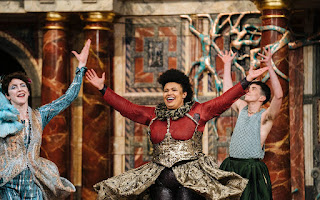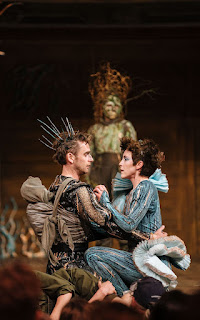Not so much in While's take, which runs with the chaotic nature of the King and Queen of the fairies having an incredibly petty argument over who gets to look after a baby, a quartet of young lovers getting mixed and matched by an uncontrollable love potion, and an am-dram group rehearsing a terrible play, the story threads occasionally colliding and confusing each other.
In over three decades of seeing this play, I don't think I've seen a production before where one half of the royal couples has one actor doubling roles and the other doesn't: Jack Laskey plays both human King Theseus and Fairy King Oberon, but has different partners. I did wonder if there might be some significance to this but there wasn't really one I spotted, instead perhaps the idea is to give the couples a different feel, an earthier touch to him and Anne Odeke's Hippolyta, a more (literally) away-with-the-fairies distraction with Marianne Oldham's Titania. (Laskey gets to do both by adding and subtracting a beard, which also helps separate his looks as the bastard love child of David Tennant and Daniel Radcliffe: Scruffy Radcliffe with the beard, whimsical Tennant without.)
Completing the main fairy cast, Terry returns to the play a decade after playing Titania to play Puck. The production hasn't gone in for the usual parts of the play to be mined for dark subtext, but instead Puck is the nexus of everything sinister: takis' costume design is heavily influenced by the Green Man, and Terry's Puck feels very much like the version that appears in The Sandman: Right on the line where mischief tips over into actual malice, there's a genuine sense of the audience shifting a bit uncomfortably every time she appears - the mask hiding her expressions helps - and she's also where the Dream literally becomes a nightmare, terrorising a sleeping Hermia. “Lord, what fools these mortals be” is a line that generally comes across as a bit rich, given that their foolishness is entirely down to Puck roofying them, and doing it wrong at that. Here though it seems apt, as Puck genuinely sees them as her playthings, and doesn't care about the consequences.
Hermia is where this year's official manufactured media furore has come from, not in the casting of Francesca Mills, but in the fact that it's been paired with a content warning for ableist language. But again, I think audience reactions speak for themselves. Mills is a gifted comic actress who quickly gets the audience seeing past her size to enoying her performance, so to then have her called "dwarf" as an insult gives these scenes a whole different context that drew gasps; I heard a disapproving "that's not right." Not that the lovers' scenes aren't still funny: Paired with Sam Crerar as Lysander, and opposite Isobel Thom and Vinnie Heaven as Helena and Demetrius, there's a bit of a physically dangerous edge to this quartet's energy, but not enough to derail the comic confusions.
The Globe has come up with some interesting takes on Bottom in the past; I must admit Mariah Gale's casting was a surprise to me and I didn't see how it would work, but it turns out to be a genius take on the usually bombastic character. Gale's Bottom is a familiar figure, the terribly earnest little performing arts girl, doing knock-kneed dances across the floor on the off-chance that anyone might be watching, stamping her foot in anger at the plane noise drowning out her performance and chastising the audience for laughing at the terribly serious tragedy. (The Pyramus and Thisbe scene takes an additional lurch into the surreal when Molly Logan's Flute suddenly decides to perform her death scene as an opera.)
All in all this is a Dream that's gone for the play's reputation as a popular favourite, and lived up to it. James Maloney's brass-heavy music helps set the scene for a production that's full of energy and bombast, and doesn't try too hard to impose a dark narrative on the play. But the places While has found darkness in are a little more original, and therefore a little more interesting, than the common practice of letting "I wooed thee with my sword" define an entire production.
A Midsummer Night's Dream by William Shakespeare is booking in repertory until the 12th of August at Shakespeare's Globe.
Running time: 2 hours 40 minutes including interval.
Photo credit: Helen Murray.






No comments:
Post a Comment